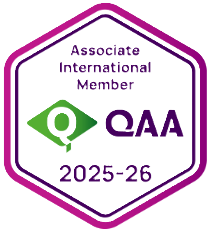Education Philosphy
Info Myanmar College Educational Philosophy (2025)
At Info Myanmar College, our educational philosophy is inspired by a transformative vision of learning that embraces the principles of constructivism, digital empowerment, and innovation. We believe that learning is an active, socially grounded process that thrives through collaboration, exploration, and the application of technology. Our mission is to prepare ethical, adaptive, and forward-thinking professionals who can contribute meaningfully to national development and global progress in a technology-driven era.
This philosophy is built on the principles of constructivist learning theory, emphasizing experiential learning, digital literacy, and real-world problem-solving. We integrate technological tools and collaborative pedagogies to support learners in developing knowledge, skills, and attitudes that extend beyond the classroom. Teaching, learning, assessment, and student support at IMC are constructively aligned to ensure coherence, growth, and relevance to the demands of the digital economy.
- Purpose
- To foster digital fluency, creativity, and innovation in every learner.
- To cultivate ethical, critical thinkers who can apply knowledge to complex technological and societal challenges.
- To nurture adaptable, lifelong learners prepared to thrive in fast-evolving digital environments and professional contexts.
- Core Values in Education
- Learning as a Constructive and Technological Process: Knowledge is best built through active engagement with real-world tasks, supported by digital platforms and collaborative tools.
- Scaffolding for Professional and Ethical Growth: Students are supported through structured, step-by-step guidance until they gain the confidence to act independently, ethically, and innovatively.
- Collaboration and Peer Learning: Learning is optimized when students work together, share insights, and challenge each other’s thinking in both physical and digital spaces.
- Innovation with Social Responsibility: We believe technology must be developed and used ethically, for the betterment of society, grounded in values such as integrity, inclusion, and accountability.
- Learning Environment
- Technology-Rich and Inclusive: Our digital classrooms and laboratories provide equitable access and foster student engagement through advanced tools and platforms.
- Responsive and Forward-Looking: The curriculum evolves with emerging technologies, ensuring graduates remain relevant in their industries and communities.
- Entrepreneurial and Applied: Students are encouraged to develop original ideas, test prototypes, and translate theory into practice through hands-on projects and start-up simulations.
- Approaches to Teaching, Learning, and Assessment
- Project-Based and Problem-Oriented Learning: Students work on interdisciplinary, authentic challenges that mimic real-life industry tasks and societal needs.
- Constructive Alignment: Learning outcomes, teaching strategies, and assessment tasks are coherently designed to deepen understanding and promote skill mastery.
- Digital Mentorship and Guided Autonomy: Teachers act as facilitators and mentors, leveraging digital platforms to support students while fostering independence and accountability.
- Multi-Modal and Performance-Based Assessment: Assessment practices capture cognitive, technical, collaborative, and ethical competencies using diverse formats such as coding tasks, team-based projects, reflective journals, and digital portfolios.
- Commitment to Student Growth and Well-Being
- Holistic Student Development: Beyond academic achievement, we emphasize emotional intelligence, social awareness, and career readiness.
- Equity and Access: We embrace diversity and ensure all students have the support and opportunities to succeed regardless of background.
- Lifelong Learning and Leadership: Students are encouraged to take charge of their learning journeys, embrace continuous improvement, and develop into proactive digital citizens and leaders.
- Community and Industry Engagement: Through internships, partnerships, and outreach projects, students apply their learning in real contexts and strengthen their civic and professional identities.
- Constructivist Alignment Across Key Areas
- Teaching: Faculty act as digital mentors and learning designers, facilitating knowledge construction and innovation through blended learning modalities.
- Learning: Students engage actively in their learning through research, coding, collaboration, and experimentation in both virtual and physical environments.
- Assessment: Evaluations measure not only mastery of content but also problem-solving abilities, ethical reasoning, teamwork, and digital creativity.
- Student Support: A strong support system integrates academic advising, career services, mental health care, and technological assistance to foster student success and well-being.

